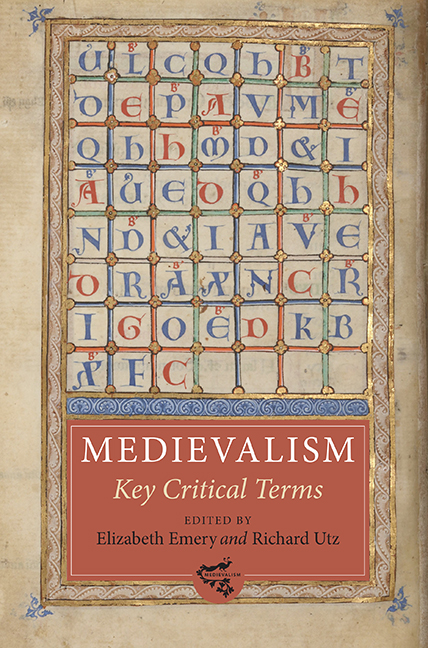Book contents
- Frontmatter
- Dedication
- Contents
- List of Illustrations
- List of Contributors
- Making Medievalism: A Critical Overview
- 1 Archive
- 2 Authenticity
- 3 Authority
- 4 Christianity
- 5 Co-disciplinarity
- 6 Continuity
- 7 Feast
- 8 Genealogy
- 9 Gesture
- 10 Gothic
- 11 Heresy
- 12 Humor
- 13 Lingua
- 14 Love
- 15 Memory
- 16 Middle
- 17 Modernity
- 18 Monument
- 19 Myth
- 20 Play
- 21 Presentism
- 22 Primitive
- 23 Purity
- 24 Reenactment
- 25 Resonance
- 26 Simulacrum
- 27 Spectacle
- 28 Transfer
- 29 Trauma
- 30 Troubadour
- Index
- Medievalism
12 - Humor
Published online by Cambridge University Press: 08 October 2022
- Frontmatter
- Dedication
- Contents
- List of Illustrations
- List of Contributors
- Making Medievalism: A Critical Overview
- 1 Archive
- 2 Authenticity
- 3 Authority
- 4 Christianity
- 5 Co-disciplinarity
- 6 Continuity
- 7 Feast
- 8 Genealogy
- 9 Gesture
- 10 Gothic
- 11 Heresy
- 12 Humor
- 13 Lingua
- 14 Love
- 15 Memory
- 16 Middle
- 17 Modernity
- 18 Monument
- 19 Myth
- 20 Play
- 21 Presentism
- 22 Primitive
- 23 Purity
- 24 Reenactment
- 25 Resonance
- 26 Simulacrum
- 27 Spectacle
- 28 Transfer
- 29 Trauma
- 30 Troubadour
- Index
- Medievalism
Summary
EVEN THOUGH MEDIEVALISM gained some respectability as a cultural and artistic phenomenon and as a state of mind in the mid-nineteenth century, those who aspire to return to medieval ways have not infrequently provoked laughter: the chivalric dreams of Don Quixote, after all, have given the English language the word quixotic. Moreover, there can be little doubt that many of its leading proponents (including John Ruskin and A. W. N. Pugin) were more earnest than humorous. This earnestness sometimes unintentionally prompted laughter, leaving those who tried to recreate a medieval world open to ridicule and parody. I would suggest, though, that intentional humor is an important strategy for medievalism because medievalism depends upon a consciously articulated comparison between “then” and “now.” Many medievalist works include characters who provide comic relief, often in combination with a side commentary on the action: for example, Wamba the Jester in Scott's Ivanhoe is able to use his position as a “fool” to speak comic truths about race and class divisions.
I focus here on two commonly used varieties of humor compatible with an affection for the Middle Ages, namely incongruity dependent on received cultural impressions of what the medieval period should be like; and a related medievalist trope, ironic hindsight. Both of these forms draw attention to the double consciousness of “then” and “now.” Helping readers understand how these forms of humor work can be a means of appreciating that medievalism is not just a style, but a way of looking at the world. Humor, then, is a means of acknowledging both the retrospective and the introspective characteristics of medievalism.
A working definition of “humor” posits that what is seen or heard prompts the initial emotion of feeling amused, a cheerful state of mind expressed almost involuntarily by smiling or laughter. My interest here is when the laughter is prompted not merely by ridicule based on a sense of superiority, but by some more introspective consciousness. As early as 1776 James Beattie suggested that “laughter seems to arise from the view of things incongruous united in some assemblage”; he also suggests that a primary “cause of laughter is something compounded; or something that disposes the mind to make a comparison, by passing from one object or idea to another” (345).
- Type
- Chapter
- Information
- Medievalism: Key Critical Terms , pp. 109 - 116Publisher: Boydell & BrewerPrint publication year: 2014

